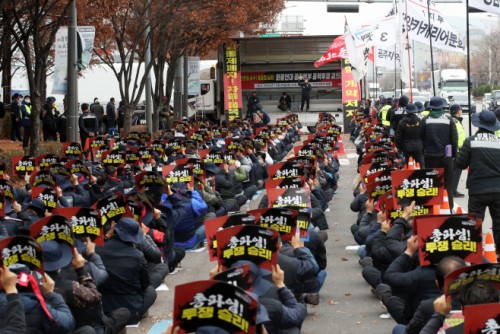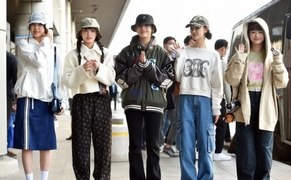 |
| Unionized truckers under the Korean Confederation of Trade Unions (KCTU) engage in sit-ins at Gwangju factory in Gwangju on Nov. 29, 2022./ Source: Yonhap |
AsiaToday reporter Jeong Min-hoon
The government issued a return-to-work order on truckers of the cement industry, intensifying the confrontation between the two sides. The Yoon Suk-yeol administration’s labor policy has been put to the test as subway and railway unions announced to go on a general strike this week.
The Yoon Suk-yeol administration has been putting emphasis on laws and principles. The government and the ruling People Power Party (PPP) made it clear that they will not be pushed back, saying that they will never ‘compromise with illegality’ after surrendering to the cargo union this spring when they first refused to do their transport duty. A confrontation between the government and the labor union seems inevitable since the trucker union cannot be active in dialogue as the labor union including subway and railway unions announced to go on a general strike.
The government issued Tuesday an executive order targeting about 2,500 drivers of cement trucks among a broader group of truckers participating in the walkout. The government formed 76 investigation teams composed of officials from the Ministry of Land, Infrastructure and Transport, as well as local governments and the police to conduct on-site investigations on 201 cement transport companies across the country. Through this, they identified the list and address of the truckers and checked whether they actually did their transport duty.
Anyone refusing the order can be punished with up to three years in jail or a fine of up to 30 million won (US$22,500). Those who do not return to work without a convincing reason may see a suspension of their license.
“There is no way to justify the act of taking the lives of people and the national economy hostage to accomplish their own interest,” President Yoon said in a Cabinet meeting. The president particularly denounced any attack by strikers on their fellow truckers refusing to participate in the walkout as an “unacceptable criminal behavior,” and said his government will take all possible measures to deal with the strike as long as they stick to “unjustified demands.”
The government decided to consider additional measures in other areas, including the gas industry. Minister of Economy and Finance Choo Kyung-ho hinted at additional measures, saying, “Some gas stations are running out of oil.”
The Cargo Truckers Solidarity (CTS) and the two major umbrella labor unions – the Korea Confederation of Trade Unions (KCTU) and the Federation of Korea Trade Unions (FKTU) – reacted furiously to the executive order, calling it “martial law against cargo laborers.” “We will not respond to the government’s anti-constitutional order, and will respond with a stronger struggle as the level of repression rises,” the CTS said in a statement. The CTS held rallies in 16 regional bases across the country and leaders of the union shaved their hair in protest against the government’s decision.
The KCTU and the FKTU criticized the government. The KCTU said the president’s wrong view on labor aggravates the situation and brings catastrophe, while the FKTU urged the government to stop threatening workers.
#executive order #truckers #strike #cargo #KCTU
Copyright by Asiatoday
Most Read
-
1
-
2
-
3
-
4
-
5
-
6
-
7





















